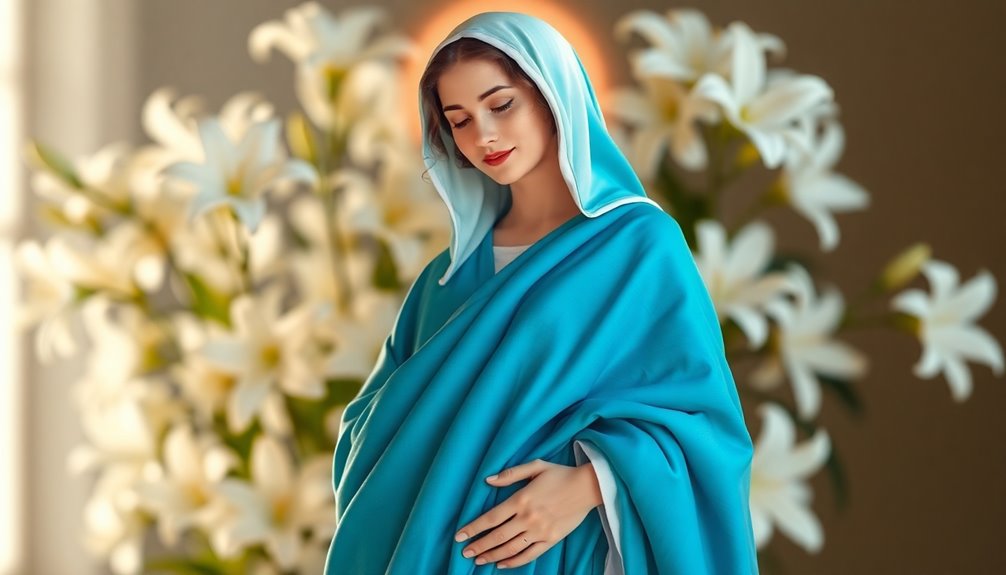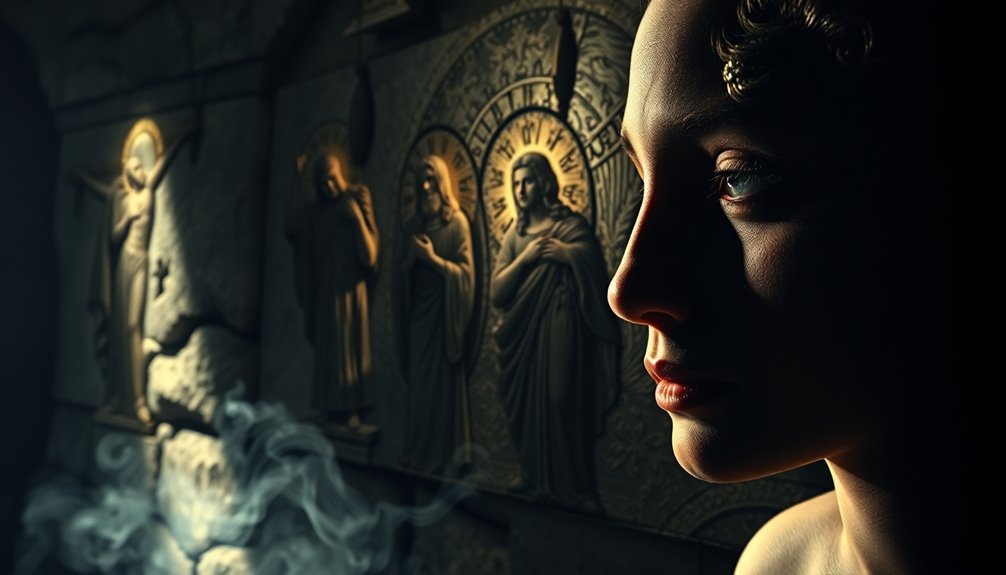Mother Mary is a significant figure in both Christianity and Islam, embodying faith and devotion. As the Virgin Mary, she accepted God's will during the Annunciation, showcasing her strong belief. You may know her as the Mother of God, celebrated for her role in Jesus' life, from His miraculous birth to her presence at the crucifixion. Across cultures, she symbolizes maternal care and love. Her influence extends beyond scripture into various community services inspired by her nurturing spirit. Explore her impact further to understand her enduring legacy and the traditions that honor her in both faiths.
Key Takeaways
- Mother Mary, known as the Virgin Mary, is a central figure in both Christianity and Islam, revered for her faith and maternal care.
- The Annunciation marks Mary's acceptance of God's will, highlighting her unwavering faith and pivotal role in salvation history.
- Mary nurtured Jesus, witnessed His crucifixion, and is celebrated for her intercessory role in various Marian feast days and devotions.
- In Islamic tradition, she is honored as Maryam, with the Quran emphasizing her miraculous conception and virtuous life.
- Mary's legacy inspires over 1.3 billion Catholics, reflected in pilgrimages to Marian shrines and practices like the Rosary.
Introduction

Mother Mary, often regarded as one of the most significant figures in religious history, plays a pivotal role in both Christianity and Islam. As the Virgin Mary, she's celebrated as the Mother of God, a title that emphasizes her unique position in the divine narrative. Born around 18 BC in Herodian Judea, she's traditionally recognized as the daughter of Joachim and Anne.
Her acceptance of God's will during the Annunciation is a cornerstone of her legacy, showing her unwavering faith and obedience.
In Christianity, key doctrines like the Immaculate Conception highlight her purity, asserting that she was conceived without original sin, making her an ideal vessel for Jesus Christ. This belief not only elevates her status but also serves as an inspiration for many believers.
Furthermore, Mary is honored in Islam as Maryam, the mother of Isa (Jesus), where she's described as a righteous and revered figure in the Quran. Through these traditions, Mother Mary bridges two major world religions, symbolizing faith, devotion, and maternal care that resonates with millions around the globe.
Biblical Significance of Mary

When you look at the Bible, Mary's role is pivotal in the story of Jesus.
From the Annunciation to the wedding at Cana, her presence shapes key moments in the New Testament.
Let's explore both primary and secondary references to understand her significance more deeply.
Primary Bible References
Highlighting Mary's pivotal role in the New Testament reveals her significance throughout the life of Jesus. First mentioned during the Annunciation in Luke 1:26-38, Mary learns from the Angel Gabriel that she'll conceive Jesus by the Holy Spirit. This moment marks her acceptance of God's divine plan.
Later, in Luke 2:1-7, you read about Mary giving birth to Jesus in a humble manger in Bethlehem, fulfilling Old Testament prophecy.
Mary's influence continues as she nurtures Jesus in His early years, notably during the Presentation in the Temple (Luke 2:22-38) and the Flight to Egypt (Matthew 2:13-15), showcasing her protective nature.
At the Wedding at Cana (John 2:1-11), Mary prompts Jesus to perform His first miracle, highlighting her role in His ministry.
Her presence at the crucifixion (John 19:25-27) emphasizes her enduring faith and the profound suffering she endured.
In these key moments, Mary not only shapes Jesus Christ's early life but also establishes herself as a central figure in the early Christian community, embodying maternal strength and unwavering devotion.
Secondary Bible References
Throughout the New Testament, Mary emerges not just as the mother of Jesus but as a vital figure whose significance resonates deeply in the Christian faith. In the New Testament account, Mary's role is highlighted from the Annunciation in Luke 1:26-38, where the angel Gabriel announces she'll conceive Jesus by the Holy Spirit. This moment underscores her acceptance of God's will and her identity as the holy Virgin.
The Gospel of Matthew (1:18-25) reaffirms her virginity and her pivotal role as the Mother of God, known as Theotokos. In Luke 1:39-56, during her visit to Elizabeth, Mary's faith shines through, leading to the Magnificat—her hymn of praise that reflects her deep spirituality and gratitude.
Mary also plays a crucial role at significant moments in Jesus' life. At the wedding at Cana (John 2:1-11), she prompts Jesus to perform his first miracle, demonstrating her faith.
Her presence at the crucifixion (John 19:25-27) reveals her unwavering support. Overall, these secondary references illustrate Mary's pivotal role in salvation history and her exemplary model of discipleship and intercession for all believers.
First-Century Jewish Society

First-century Jewish society was primarily agrarian, with most people living in rural areas and depending on farming for their livelihoods. Urban centers like Jerusalem acted as trade and religious hubs, where the Temple played a crucial role in worship and community life.
You'd notice that the society was deeply patriarchal, with men holding most authority. Women often found themselves confined to domestic roles, but some were significant contributors to religious and communal activities.
Jewish law (Halakha) shaped daily life in profound ways. It governed everything from dietary restrictions to Sabbath observance, ensuring that religious practices permeated every aspect of existence. You'd see families adhering to these laws, with mothers playing vital roles in teaching children about faith and tradition.
Social divisions existed among various groups, including the Pharisees, Sadducees, and Zealots, each interpreting the Torah differently and responding uniquely to Roman occupation. The interplay of these dynamics created a complex society where faith, gender roles, and social class influenced everyday interactions.
Understanding this context is essential when considering figures like Mary, who navigated these intricate societal norms as a mother and member of her community.
Cultural Context of Mary
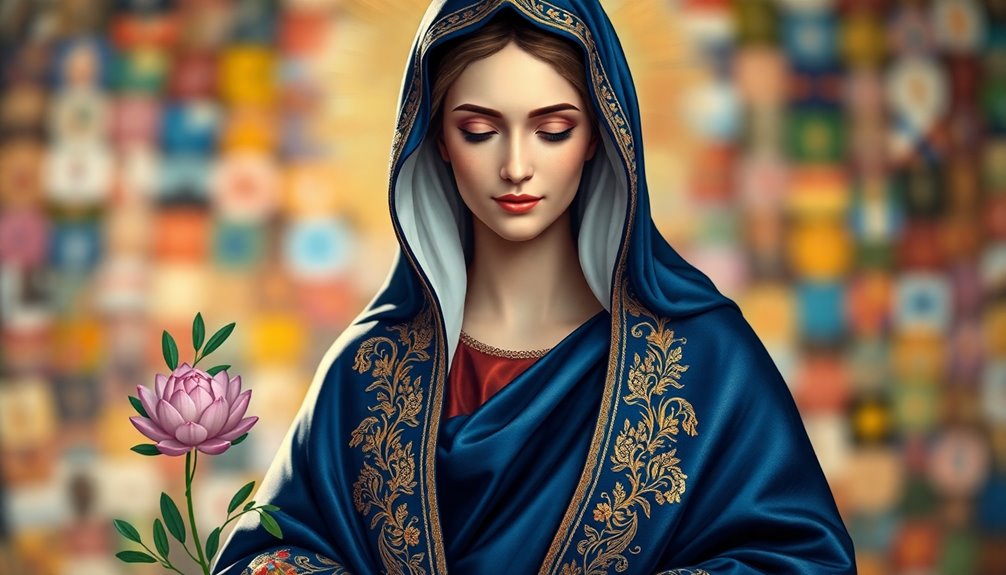
Mary's cultural significance transcends borders and religions, making her a powerful symbol of motherhood and purity. In Christianity, her role is celebrated through various Marian feast days, where communities come together to honor her. These events, along with pilgrimages to sacred sites like Lourdes and Guadalupe, strengthen communal bonds and deepen individual devotion.
You can see how artistic representations of Mary evolved over time, reflecting changing cultural attitudes toward femininity and spirituality in Byzantine, medieval, and Renaissance art.
In Islamic culture, Maryam (Mary) is also revered; the Quran highlights her miraculous conception of Isa (Jesus), enhancing her respect among Muslim communities. This shared reverence illustrates her universal role as a mother figure.
Cultural interpretations of Mary vary widely, as seen in local customs and festivals. For instance, the Feast of Our Lady of Guadalupe in Mexico intertwines indigenous traditions, emphasizing her role as a protector of the marginalized.
Through these diverse expressions, Mary embodies the essence of motherhood, connecting people across different backgrounds and beliefs, fostering a sense of unity and reverence that endures through the ages.
Misunderstandings About Mary's Role
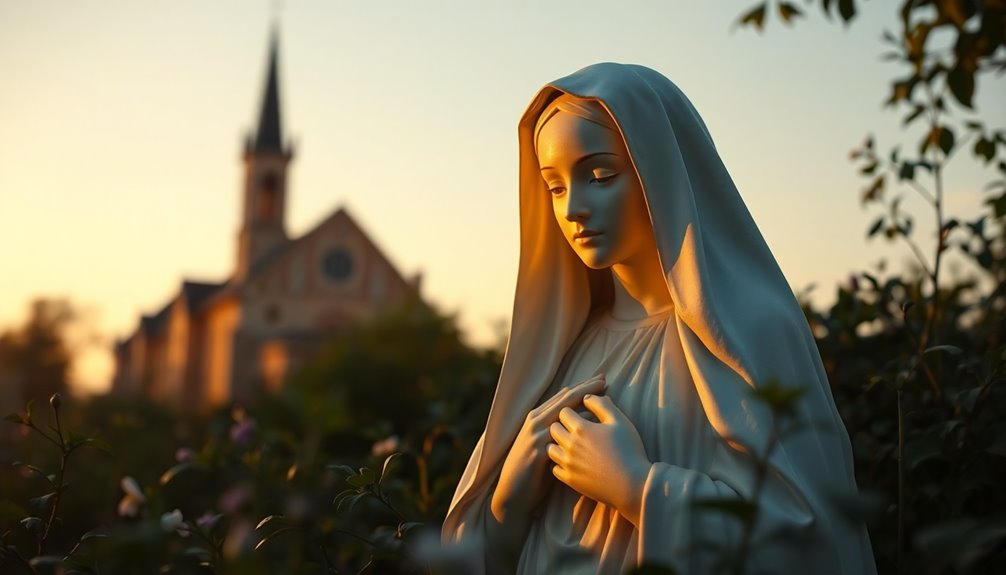
You might think Mary's perpetual virginity means she'd no other children, but interpretations vary among different Christian groups.
Additionally, some question her authority in the faith, not realizing her unique role in the salvation story.
Let's clarify these misconceptions to better understand Mary's significance.
Address Misconceptions About Virginity
While many people hold varying beliefs about Mary's virginity, understanding her role within the context of Christian doctrine is essential. The belief in Mary's perpetual virginity asserts that she remained a virgin before, during, and after the birth of Jesus. This doctrine, upheld by the Catholic Church and supported by early Church Fathers, emphasizes her unique purity and vital role in salvation history.
The term "Virgin Mary" specifically refers to her miraculous conception of Jesus through the Holy Spirit, highlighted in the Annunciation account in Luke 1:26-38. Some Protestant denominations interpret references to Jesus' "brothers" as evidence that Mary had other children. However, Catholic tradition explains these figures as either Jesus' cousins or Joseph's children from a previous marriage, preserving the belief in her perpetual virginity.
Additionally, the title "Theotokos," meaning "God-bearer," reflects Mary's integral part in the Incarnation, reinforcing the understanding that her virginity is central to God's redemptive plan.
The Immaculate Conception dogma further affirms this by teaching that Mary was conceived without original sin, underscoring her exceptional role in Christian faith.
Concerns About Mary's Authority
Concerns about Mary's authority often arise from misunderstandings that can overshadow her true role in Christianity. Many people mistakenly believe that recognizing Mary as "Mother of God" detracts from the uniqueness of Christ's divinity. This misconception can lead to a dismissal of her authority and significance in salvation history.
It's essential to understand that Mary is known for her intercession, which the Catholic Church teaches as a way to draw believers closer to Jesus rather than undermining His mediation.
Controversy also surrounds the title "Co-redemptrix." While some see it as affirming Mary's vital role in salvation, others fear it compromises Christ's sole redemptive work.
Meanwhile, various Protestant denominations often adhere to the "sola scriptura" principle, which can diminish Mary's recognized authority and her contributions to faith.
Additionally, misunderstandings about Mary's perpetual virginity fuel debates about her marital status, especially concerning references to Jesus' "brothers."
Clarifying these issues helps reinforce Mary's rightful place in Christian belief and emphasizes that acknowledging her role doesn't diminish Christ's supremacy but rather enriches the faith experience.
Faith in Daily Life
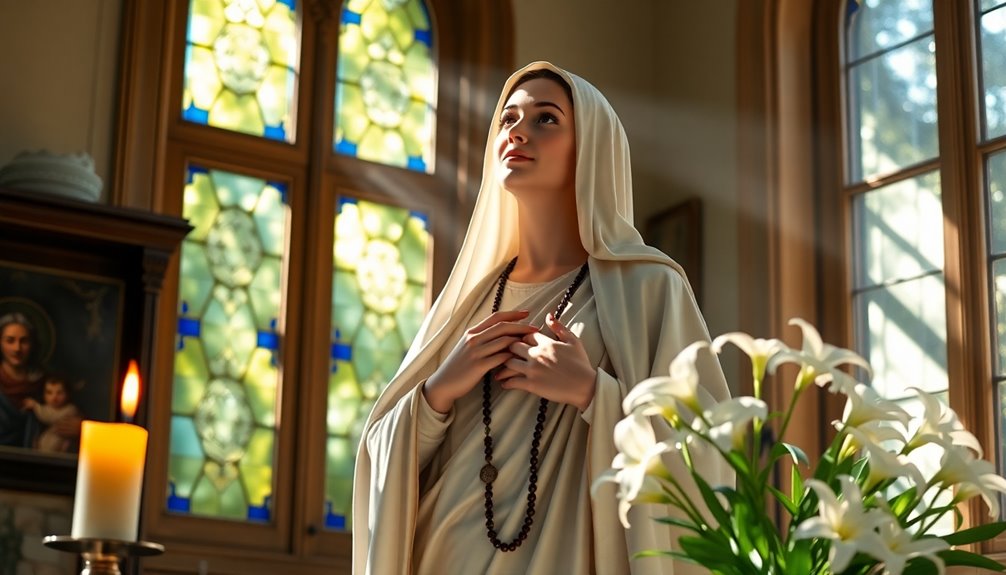
When you face parenting decisions, turning to Mother Mary can provide inspiration and guidance. Her example of love and commitment encourages you to approach challenges with faith and resilience.
Additionally, incorporating your faith into community service initiatives allows you to live out her values and make a meaningful impact in the lives of others.
Faith in Parenting Decisions
In the journey of parenting, faith often serves as a guiding light, shaping crucial decisions and actions. Mary exemplified unwavering faith in her choices, accepting the angel Gabriel's announcement with grace and trust. Her decision to raise Jesus according to Jewish customs reflects a strong commitment to faith-based parenting, ensuring He was grounded in spiritual traditions.
Throughout challenging times, like fleeing to Egypt to protect her son from King Herod, Mary demonstrated resilience and adaptability. These actions weren't just about physical safety; they also highlighted her dedication to nurturing spiritual growth, allowing Jesus to develop in a secure environment filled with love and faith.
Mary's presence during significant moments, such as the wedding at Cana, underscores the importance of faith and support in making pivotal life decisions. As you navigate your own parenting journey, consider how your faith informs your choices and remember that support networks can provide invaluable guidance as you strive to create a nurturing environment for your children. Embrace the lessons from Mary's example as you strive to create a nurturing environment for your children.
Community Service Initiatives
Community service initiatives inspired by Mary's teachings can significantly enhance your daily life and the lives of those around you. Emphasizing compassion and outreach, these initiatives reflect the caring nature of the Blessed Virgin Mary.
Many churches and faith organizations engage in community service projects like food drives, clothing donations, and support for the homeless, embodying Mary's nurturing spirit.
You can also encourage young people to participate in programs dedicated to youth that highlight the importance of service. By doing so, you help instill values of selfless love and community involvement, following Mary's example.
Marian feast days provide excellent opportunities for congregations to unite in outreach activities, directly benefiting local charities.
Additionally, incorporating intercessory prayers to Mary during community service events can foster a spirit of generosity among participants. By seeking her guidance, you can inspire others to embrace service projects that create a positive impact.
Whether you're donating time, resources, or simply sharing compassion, community service inspired by Mary can transform lives, strengthening both your faith and the bonds within your community.
Mary's Enduring Legacy Today
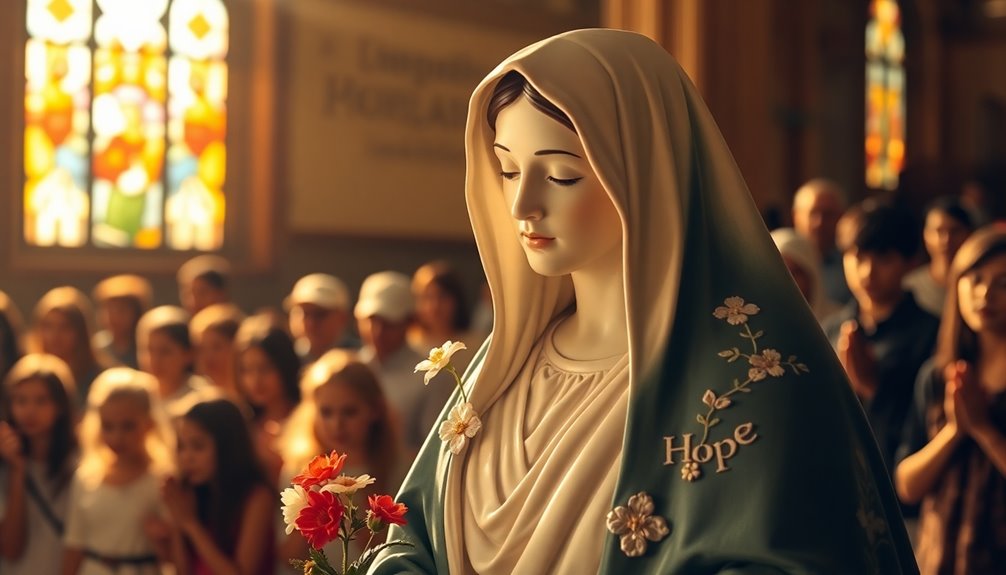
Throughout the centuries, Mary's legacy continues to resonate deeply within Christianity, drawing millions of believers to her as a source of inspiration and hope. As the Mother of God, she holds a significant place in the hearts of over 1.3 billion Catholics worldwide.
You'll find that Marian shrines attract countless pilgrims each year, reflecting her profound influence across Christian traditions.
Marian devotions, such as the Rosary and the Seven Sorrows, play a vital role in the spiritual lives of many. These practices emphasize her role as an intercessor and a model of faithfulness, allowing believers to connect with her in their daily lives.
The theological significance of titles like Theotokos continues to shape doctrinal teachings, making her an enduring figure in various denominations.
Moreover, Mary's impact extends beyond spirituality; her artistic representations have left an indelible mark on Western art and culture.
You'll see her virtues celebrated in paintings, music, and literature, reinforcing her significance in salvation history.
As discussions around gender and motherhood evolve, Mary often symbolizes hope, compassion, and resilience, reminding us of her enduring legacy in our modern world.
Additional Resources
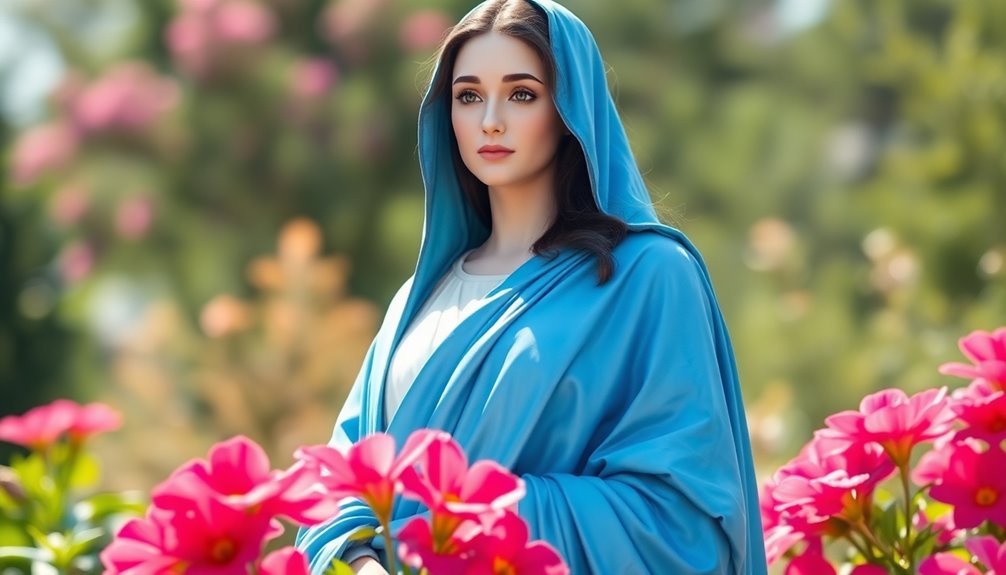
Mary's profound influence is supported by a wealth of additional resources that can enrich your understanding and devotion. Numerous apocryphal texts, like the Gospel of James, offer insights into her life, including her parents, Joachim and Anne, and her early consecration in the Temple. Engaging with these texts can deepen your appreciation for her role in salvation history.
The Catholic Church provides various tools for Marian devotion, such as the Rosary and the Seven Sorrows devotion. These practices can help you cultivate a closer relationship with Mother Mary, enhancing your spiritual life.
Additionally, major Marian feast days, like the Annunciation on March 25 and the Assumption on August 15, serve as important reminders of her significance in the Christian faith.
Visiting pilgrimage sites like Lourdes and Fatima can also inspire you, as many report miraculous experiences and testimonies of faith there.
Furthermore, exploring theological writings from the Church Fathers gives you a deeper understanding of Mary's virtues and intercessory power. These resources collectively enrich your journey in appreciating the profound impact of Marian devotion in your life.
Frequently Asked Questions
What Is Mother Mary Known For?
You might know that she's often associated with grace and compassion, embodying unwavering faith.
Many see her as a model of acceptance and humility, especially during challenging times. People admire her role as a nurturing figure and intercessor, believing she offers guidance and support.
Additionally, her influence spans various cultures and traditions, inspiring countless acts of devotion and reverence throughout history, making her a significant figure for many around the world.
Which Mary Was Jesus' Mother?
When you think about Jesus' mother, you're referring to Mary, often called the Virgin Mary.
She's central to the story of Jesus' birth, celebrated for her role in the miraculous conception. In the Gospels, you'll find accounts of her life, including the Annunciation, where the angel Gabriel reveals her divine pregnancy.
Mary's presence during key events in Jesus' life, like the crucifixion, highlights her importance in the Christian faith.
What Are 5 Facts About Mary?
You might find it interesting that Mary is a central figure in Christianity, known for her miraculous conception of Jesus.
She's often called Theotokos, which means "God-bearer." Catholics believe in the Immaculate Conception, asserting she was born without sin.
In the Quran, she's recognized as Maryam, the mother of Isa.
Significant events in her life, like the Annunciation, are detailed in the Gospels, showcasing her vital role in the New Testament.
Why Do Catholics Call Mary Their Mother?
Catholics call Mary their mother because they see her as a vital spiritual figure.
She embodies acceptance and faith, having said "yes" to God's plan. By viewing her as a mother, you connect with her compassion and guidance.
This relationship offers comfort and support in your faith journey. You recognize her role in interceding for believers, helping you grow closer to Christ, reflecting her importance in your spiritual life.

